人教八年级英语unit3教案
- 格式:doc
- 大小:58.00 KB
- 文档页数:18
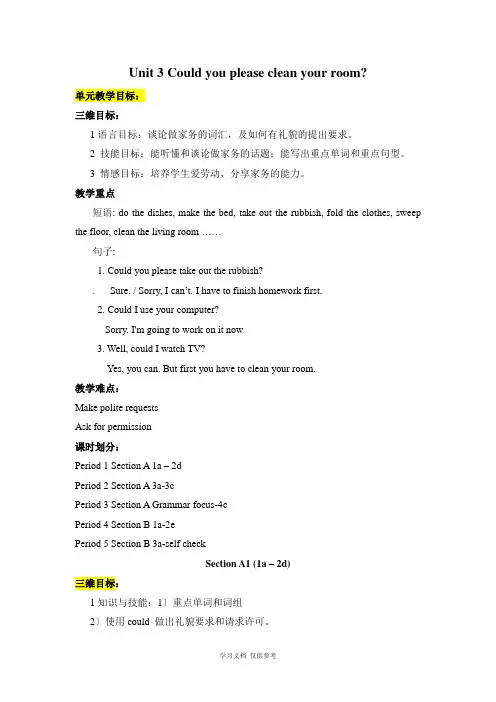
Unit 3 Could you please clean your room?单元教学目标:三维目标:1语言目标:谈论做家务的词汇,及如何有礼貌的提出要求。
2 技能目标:能听懂和谈论做家务的话题;能写出重点单词和重点句型。
3 情感目标:培养学生爱劳动,分享家务的能力。
教学重点短语: do the dishes, make the bed, take out the rubbish, fold the clothes, sweep the floor, clean the living room ……句子:1. Could you please take out the rubbish?. Sure. / Sorry, I can’t. I have to finish homework first.2. Could I use your computer?Sorry. I'm going to work on it now.3. Well, could I watch TV?Yes, you can. But first you have to clean your room.教学难点:Make polite requestsAsk for permission课时划分:Period 1 Section A 1a – 2dPeriod 2 Section A 3a-3cPeriod 3 Section A Grammar focus-4cPeriod 4 Section B 1a-2ePeriod 5 Section B 3a-self checkSection A1 (1a – 2d)三维目标:1知识与技能:1〕重点单词和词组2〕使用could 做出礼貌要求和请求许可。
2.过程与方法:通过合作探究的方法结局本课的重点知识点3.情感态度与价值:学会照顾自己,培养自己的独立意识。
教学重点:谈论做家务的词汇,情态动词could的使用方法。
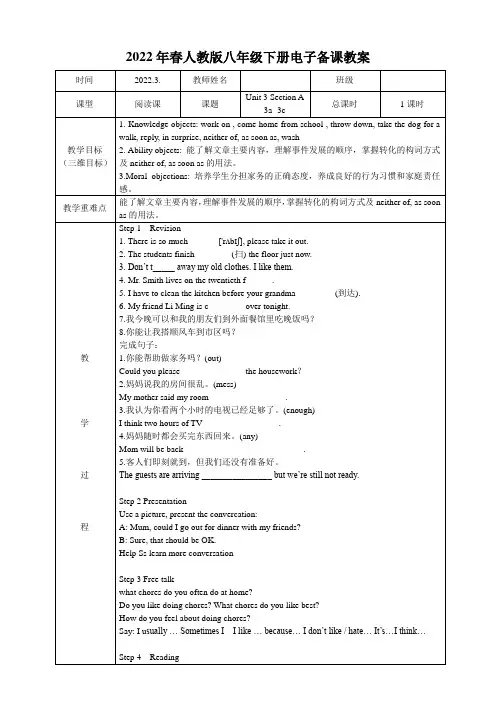
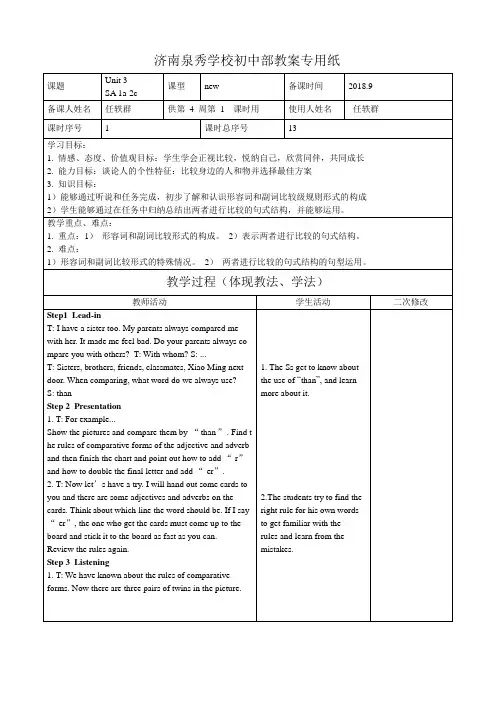
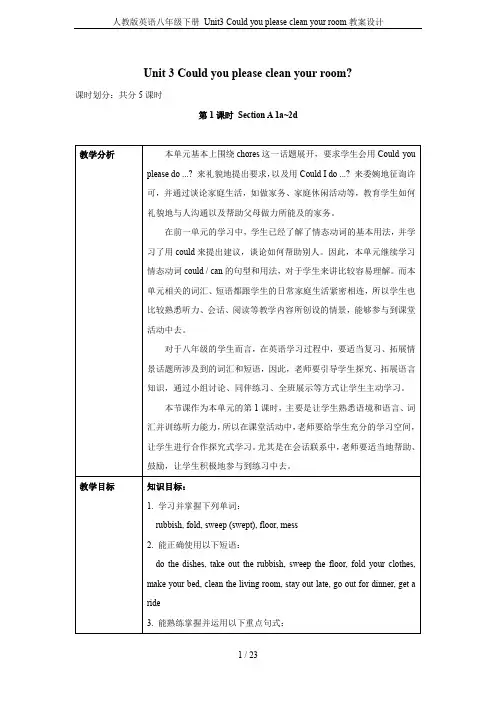
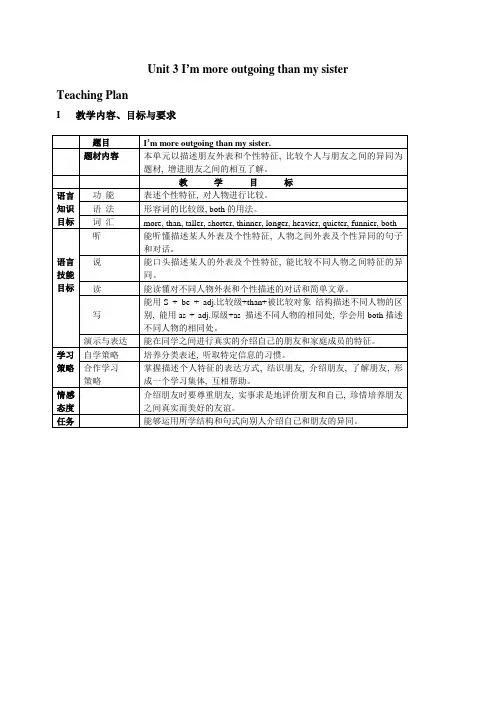
Unit 3 I’m more outgoing than my sister Teaching PlanI 教学内容、目标与要求II 教学内容分析本单元以描述某人的个性特征为中心而展开, 从外表和性格两方面比较人物之间的相同与不同点, 由此引出taller, shorter, thinner, longer, heavier, calmer, wilder, quieter, funnier, more athletic, more popular, more serious, more outgoing 等词汇, 以及“S + be + adj.比较级+than+被比较对象”这个重要的句子结构。
Section A部分重在要求听说读三个方面比较不同双胞胎之间外表和性格的区别, 附带着在3a也提出了as….as 结构the same as结构表达两人的相同之处。
与Section A部分比较, Section B 部分则深入到比较自己和朋友的相同与不同之处, 并提出了“选择朋友”这个话题, 引导学生正确评价朋友, 引导学生结识真正的好朋友。
III 教学过程建议围绕本单元“描述个性特征”这一话题,教师可以在课堂上展开系列的两人一组活动引出本单元的主要单词和句子结构“S + be + adj.比较级+than+被比较对象”。
如任务一:你眼里的我?学生两人一组展开活动,分别在各自的卡片上写下一些形容词,描述对方的身体和性格特点。
任务二:咱们相同吗?学生两人一组展开活动,通过比较各自的卡片,找出自己和对方相同的地方,简单地表述这些相同之处,然后进一步比较这些相同之处,说说它们在程度上的区别。
也可以准备一些教师自己或学生不同时期的照片,先用所学过的形容词描述照片,然后把两类照片进行比较,从而引出本单元所要讲的形容词的比较级。
本单元的听力练习教师可以根据学生的实际情况适当的扩展增加或降低难度。
在“说”方面,教师应尽量选择学生感兴趣的话题,激发学生开口交流。
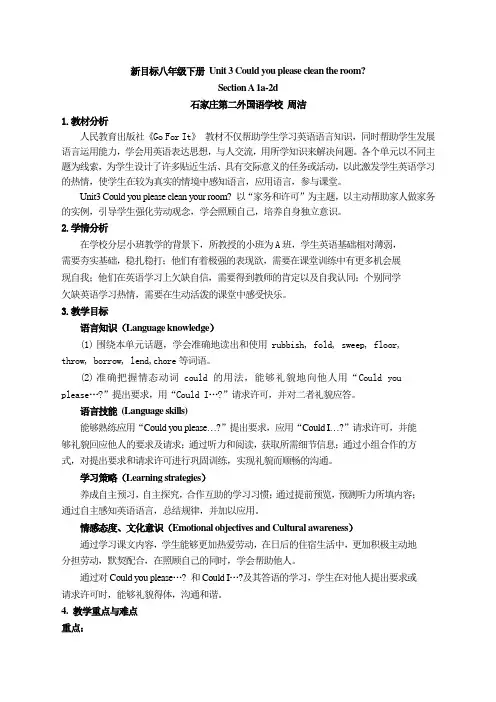
新目标八年级下册Unit 3 Could you please clean the room?Section A 1a-2d石家庄第二外国语学校周洁1.教材分析人民教育出版社《Go For It》教材不仅帮助学生学习英语语言知识,同时帮助学生发展语言运用能力,学会用英语表达思想,与人交流,用所学知识来解决问题。
各个单元以不同主题为线索,为学生设计了许多贴近生活、具有交际意义的任务或活动,以此激发学生英语学习的热情,使学生在较为真实的情境中感知语言,应用语言,参与课堂。
Unit3 Could you please clean your room? 以“家务和许可”为主题,以主动帮助家人做家务的实例,引导学生强化劳动观念,学会照顾自己,培养自身独立意识。
2.学情分析在学校分层小班教学的背景下,所教授的小班为A班,学生英语基础相对薄弱,需要夯实基础,稳扎稳打;他们有着极强的表现欲,需要在课堂训练中有更多机会展现自我;他们在英语学习上欠缺自信,需要得到教师的肯定以及自我认同;个别同学欠缺英语学习热情,需要在生动活泼的课堂中感受快乐。
3.教学目标语言知识(Language knowledge)(1)围绕本单元话题,学会准确地读出和使用rubbish, fold, sweep, floor, throw, borrow, lend,chore等词语。
(2)准确把握情态动词could的用法,能够礼貌地向他人用“Could you please…?”提出要求,用“Could I…?”请求许可,并对二者礼貌应答。
语言技能(Language skills)能够熟练应用“Could you please…?”提出要求,应用“Could I…?”请求许可,并能够礼貌回应他人的要求及请求;通过听力和阅读,获取所需细节信息;通过小组合作的方式,对提出要求和请求许可进行巩固训练,实现礼貌而顺畅的沟通。
学习策略(Learning strategies)养成自主预习,自主探究,合作互助的学习习惯;通过提前预览,预测听力所填内容;通过自主感知英语语言,总结规律,并加以应用。
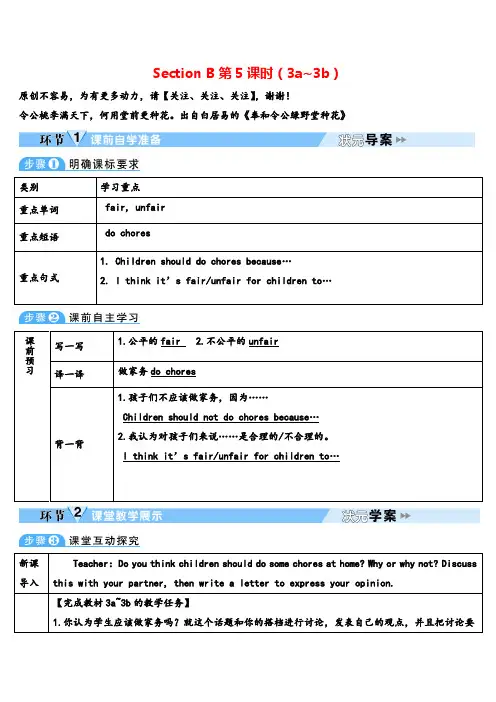
Section B第5课时(3a~3b)原创不容易,为有更多动力,请【关注、关注、关注】,谢谢!令公桃李满天下,何用堂前更种花。
出自白居易的《奉和令公绿野堂种花》类别学习重点重点单词 fair, unfair 重点短语 do chores重点句式1. Children should do chores because…2. I think it’s fair/unfair for children to…课前预习写一写1.公平的fair2.不公平的unfair译一译做家务do chores背一背1.孩子们不应该做家务,因为……Children should not do chores because…2.我认为对孩子们来说……是合理的/不合理的。
I think it’s fair/unfair for children to…新课导入Teacher:Do you think children should do some chores at home? Why or why not? Discuss this with your partner, then write a letter to express your opinion.【完成教材3a~3b的教学任务】1.你认为学生应该做家务吗?就这个话题和你的搭档进行讨论,发表自己的观点,并且把讨论要新课展示点写下来,然后请部分学生当众陈述自己的观点,完成3a。
2.根据3a中的观点要点,写一篇短文阐述自己的观点,完成后小组内互相交流纠错,借鉴好词好句,教师抽查点拨。
典例参考I think we should help parents do some chores.First, after a whole day’s work, our parents must be very tired. If we help them with the housework, they’ll feel quite happy and pleased. And by doing housework, we will know how har it is for our parents to go to work everyday while raising a family.We will make even greater efforts in our study later on.Second, doing housework can not only train in our abilities, but also help us makea sense of responsibility. There is a lt of housework in each family. As a member of thefamily, each of us should share housework with our parents. We can realize we’re members of our families through the housework.Finally, doing som housework can give us a chance to do some physical exercses. Since the students have to sit most of the time,doing housework is certainly beneficial to our health.So, I think it is necesary for usto do some housework.3.让学生参考学案上的单元同步作文指导,然后完成实战演练。
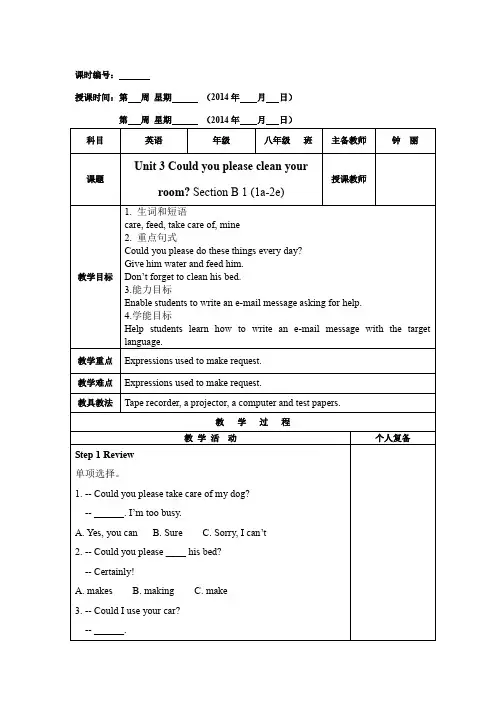
课时编号:授课时间:第周星期(2014年月日)第周星期(2014年月日)科目英语年级八年级班主备教师钟丽课题Unit 3Could you please clean yourroom? Section B 1 (1a-2e)授课教师教学目标1. 生词和短语care, feed, take care of, mine2. 重点句式Could you please do these things every day?Give him water and feed him.Don’t forget to clean his bed.3.能力目标Enable students to write an e-mail message asking for help.4.学能目标Help students learn how to write an e-mail message with the target language.教学重点Expressions used to make request.教学难点Expressions used to make request.教具教法Tape recorder, a projector, a computer and test papers.教学过程教学活动个人复备Step 1 Review单项选择。
1. -- Could you please take care of my dog?-- ______. I’m too busy.A. Yes, you canB. SureC. Sorry, I can’t2. -- Could you please ____ his bed?-- Certainly!A. makesB. makingC. make3. -- Could I use your car?-- ______.A. Sure, you canB. Sorry, you canC. Sure, I can4. Could you help _____?A. making the bedB. make the bedC. made the bedStep 2 DiscussionQ1: Do you help your parents do the chores at home?Q2: Do you ask your parents’ permission for?Q3: Do your parents ask you to do some things for them?Give some pictures and answer the following questions.What do your parents ask you to do?What do you ask your parents’ permission for?Step 3Finish 1a. What do teenagers ask their parents’permission for? What do parents ask their teenagers to do?Write parents or teenagers next to each phrase.1. buy some drinks and snacks2. borrow some money3. clean your room4. invite my friends to a party5. go to the store6. use your CD player7. take out the rubbish8. make your bedStep 4.Finish 1b. Use the phrases in 1a to make conversations.Step 5 Pair work1. Parents: Could you please…?Child: Yes, sure. / Sorry, I can’t. I have to ...2. Child: Could I …?Parents: Yes, you can. / No, you can’t. You ...Finish 1c. Listen to a conversation between Sandy and her mom. Check (√ ) the things in 1a that you hear.1. buy some drinks and snacks2. borrow some money3. clean your room4. invite my friends to a party5. go to the store6. use your CD player7. take out the rubbish8. make your bedFinish 1d. Listen again. Fill in the chart.What are they going to do?Sandy’s momSandy invite her friendsSandy and DaveStep 7 Finish 1e.You are having a party. Invite your partner to come your party and ask for help with these things. So, talk about the following things with your partner.e.g.A: Would like to come to my birthday party?B: Yes, I’d love to./Sorry, I can’t. I have to…A: Could you please take out the rubbish?B: Yes, sure./No, I can’t. I have to do…1. Warming up2a. Discuss the questions with your partner1) What do you often do to help your parents at home?2) Do you think kids should help out with chores at home?2. New wordsstress n. 精神压力; 心理负担waste n.浪费; 垃圾v. 浪费; 滥用depend v. 依靠; 依赖w W w . X k b 1.c O mdevelop v. 发展; 壮大fairness n.公正性; 合理性since conj. 因为; 既然prep., conj. & adv. 从……以后; 自……以来eighbor(= neighbour) n. 邻居drop v. 落下; 掉下3. Skimming2b. The Sunday Mail magazine invited parents to write about whether they think young people should do chores at home. Skim the following letters. Which one agrees and which one disagrees?了解阅读策略:Skimming 意为“快速掠过,从中提取最容易取得的精华”。
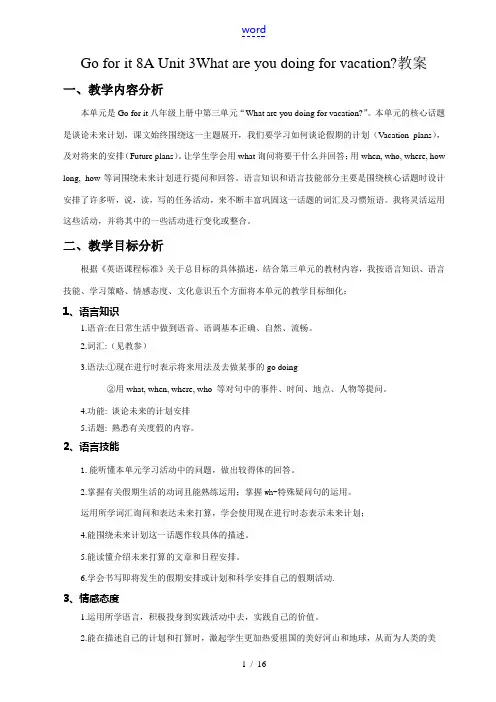
Go for it 8A Unit 3What are you doing for vacation?教案一、教学内容分析本单元是Go for it八年级上册中第三单元“What are you doing for vacation?”。
本单元的核心话题是谈论未来计划,课文始终围绕这一主题展开,我们要学习如何谈论假期的计划(Vacation plans),及对将来的安排(Future plans)。
让学生学会用what询问将要干什么并回答;用when, who, where, how long, how等词围绕未来计划进行提问和回答。
语言知识和语言技能部分主要是围绕核心话题时设计安排了许多听,说,读,写的任务活动,来不断丰富巩固这一话题的词汇及习惯短语。
我将灵活运用这些活动,并将其中的一些活动进行变化或整合。
二、教学目标分析根据《英语课程标准》关于总目标的具体描述,结合第三单元的教材内容,我按语言知识、语言技能、学习策略、情感态度、文化意识五个方面将本单元的教学目标细化:1、语言知识1.语音:在日常生活中做到语音、语调基本正确、自然、流畅。
2.词汇:(见教参)3.语法:①现在进行时表示将来用法及去做某事的go doing②用what, when, where, who 等对句中的事件、时间、地点、人物等提问。
4.功能: 谈论未来的计划安排5.话题: 熟悉有关度假的内容。
2、语言技能1.能听懂本单元学习活动中的问题,做出较得体的回答。
2.掌握有关假期生活的动词且能熟练运用;掌握wh-特殊疑问句的运用。
运用所学词汇询问和表达未来打算,学会使用现在进行时态表示未来计划;4.能围绕未来计划这一话题作较具体的描述。
5.能读懂介绍未来打算的文章和日程安排。
6.学会书写即将发生的假期安排或计划和科学安排自己的假期活动.3、情感态度1.运用所学语言,积极投身到实践活动中去,实践自己的价值。
2.能在描述自己的计划和打算时,激起学生更加热爱祖国的美好河山和地球,从而为人类的美好明天贡献自己的一份力量。
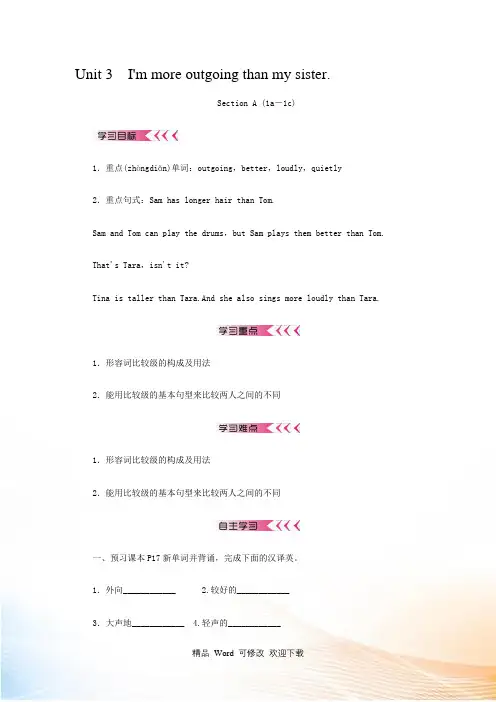
Unit 3I'm more outgoing than my sister.Section A (1a-1c)1.重点(zhòngdiǎn)单词:outgoing,better,loudly,quietly2.重点句式:Sam has longer hair than Tom.Sam and Tom can play the drums,but Sam plays them better than Tom.That's Tara,isn't it?Tina is taller than Tara.And she also sings more loudly than Tara.1.形容词比较级的构成及用法2.能用比较级的基本句型来比较两人之间的不同1.形容词比较级的构成及用法2.能用比较级的基本句型来比较两人之间的不同一、预习课本P17新单词并背诵,完成下面的汉译英。
1.外向____________ 2.较好的____________3.大声地____________ 4.轻声的____________二、认真(rèn zhēn)预习1a-1c,找出下列句型。
1.萨姆的头发比汤姆的头发长。
________________________________________________________________________ 2.萨姆和汤姆会敲鼓,但是萨姆敲得比汤姆好。
________________________________________________________________________ 3.那是塔拉,是吗?________________________________________________________________________ 4.蒂娜比塔拉高,而且她唱歌的声音也比塔拉大。
________________________________________________________________________Step 1情景导入Teacher shows some pictures of famous people,then compare the persons with Comparative Forms of Adjectives and Adverbs.环节说明:通过比较直接引入本节课的学习重点——形容词和副词的比较级。
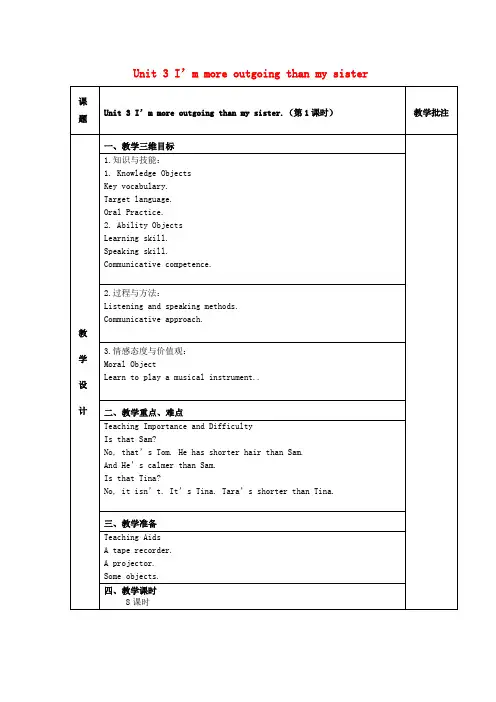
Unit 3 Could you please clean yourroom?The fifth period Section B (2a-2e)Teaching aims:Knowledge aims:1. Learn to use the following words and phrases.enough stress, a waste of…..,there is no need for …to …,mind doing sth. ,spend time doing sth., in order to the earlier…, the better….2. Review how to make polite requests how to ask permissions politely3. Read the letters carefully , and understand thereading materials clearly.Ability aims:1. Practice speaking, reading and writing skills.2. Interview your friends, your teachers or yourparents about their opinions about kids doing chores and take notes.Moral aims:Discuss with your partners and show your own opinions.Teaching Important points :Learn to use some important phrases and target languages.Teaching difficult points:1.Improve Ss’ ability to retell the letters.2.Interview your friends, your teachers or yourparents about their opinions about kids doing chores and take notes.3.Express your opinions about doing chores.Teaching procedures:Step 1 Warming-up1.Sing an English song.2.Free talk about doing chores. Could youplease ….?/Yes, sure. /….Step 2. Before reading.1.Watch a video about doing chores.2.Let Ss say out the chores in the video.eg: clean your room /help do the dishes / take the dog for a walk…3.Ask Ss to discuss the following questions witha partner.①What do you often do to help your parents at home?②Do you think kids should help out with chores athome?Students share their answers. Let Ss list the chores they can do.Step 3. While reading1.What’s “Skimming”?2. Fast reading. The Sunday Mail magazine invited parents to write about whether they think young people should do chores at home. Skim the following letters and answer the question:. Who doesn’t agree that students should do chores at home, Mr. Smith or Ms. Miller?3. Careful reading.(1).Read the first letter, and answer the following questions:Q1.What does Ms. Miller think the students should do at home?Q2.Why does Ms. Miller think there is no need for the students to do chores at home?Q3.Who does Ms. Miller think should provide a clean and comfortable home?(2).Read the second letter, and answer the following questions:Q1.Does Mr. Smith think children depend on their parents too much?Q2.How can doing chores help children in Mr. Smith’s opinion?Q3.What does Mr. Smith want us to learn from his neighbor’s story?(3).Let the Ss read the two letters, and fill in the chart in 2c.①.Read the examples, and guess the meanings of “pro”and “con”.②.According to Mr. Smith and Ms. Miller, what are the pros and cons about kidsdoing chores.(4).Students read the two letters and find out the difficult points.(5).Discuss and try to use the useful expressions in groups.a waste of…..there is no need for …to …mind doing sth.Spend time doing sth.in order tothe earlier…, the better….Step 4 After reading.1. Retell the two letters according to the key words and the chart.2. Discuss the question with a partner.Which letter do you agree with? Why?Step 5 Homework.Do you think children should do some chores at home? Make a survey in your class. Then write a report.The sixth period Section B (3a-self check )复习课Teaching aims:Knowledge aims:1. Review the following words and phrases.help with housework and chores at home, enough stress,a waste of…..,there is no need for …to …,minddoing sth. ,spend time doing sth., in order to the earlier…, the better…. It is important for sb. to do sth. develop children’s independence2. Review how to make polite requests how to ask permissions politelyAbility aims:1. Learn how to show your own opinions.2. Practice speaking, and writing skills.Moral aims:Discuss with your partners and show your own opinions.Teaching Important points :1. Learn how to show your own opinions.2. Practice speaking, and writing skills.Teaching difficult points:1.Improve Ss’ ability to write letters.2.Express your opinions about doing chores.Teaching procedures:Step 1 Warming-up1.Sing an English song.2.Free talk about doing chores or asking for parents’ permissions..Could you please ….?/Yes, sure. /…. /Could I ? /Step 2 Revision1.Have a dictation.2.Ask students to sum up the words and useful expressions in this unit.3.Ask students to complete Self check 1Check the answers:1. do the dishes2.clean your room/ the living room3.make the bed.4. fold the clothes.5. sweep the floor6. take out the rubbishStep 3 Practice1. Make conversations about doing chores or asking for parents’ permissions.eg : (1).A. Could you please sweep the floor / ?B. Yes, sure. Could you please do the dishes?A. No problem.(2).A. Could I invite my friends to a party / ?B. No, you can’t have a party. You have a teston Monday.2. Complete Self check 2.Are these polite requests or permissions? Write the numbers in the correct places in the chart.Then check the answers.3. Let the students use the questions in Self check2 to write a conversation.4. Ask several students to read out theirconversations.Step 4. Writing .1.Discuss the questions with a partner. And takenotes.Do you think children should do some chores at home?Why or why not?2.Encourage students to give their ideas.3. How to write a letter1. 信头:发信人地址和日期。
Unit 3I'm more outgoing than my sister.Section A是基本的语言部分,打好本单元目标语言的基础。
运用听力(1b,2a,2b)、pair-work(1c,2c)、role-play (2d)等口语练习活动,层层递进,步步深入,充分培养学生学习目标英语的语感。
目标语言(语法和词汇)是在每个单元的开始通过图片和对话框呈现的。
图片将帮助学生建立一个自然的语境,让学生清晰地理解新的语言目标,熟悉这些语言在日常生活中是怎样使用的。
Section B是比较级的拓展和综合的语言运用。
1a,1b通过讨论在朋友身上什么是最重要的,为后面提供基本句子如makes me laugh等。
1c,1d通过听力继续以朋友为话题以比较级为语法谈论朋友。
2b,3c是通过阅读和写作最后达到综合运用语言的目的,2b培养真实生活中的语言阅读技能。
4通过谈论谁是合适的student helper来继续巩固运用目标语言。
Self Check 2考查五个形容词的用法及区别形容词比较级与原级的使用。
Self Check 3运用比较级对比自己和好友。
第一课时Section A(1a-2d)Teaching Goals【教学目标】Key words:outgoing,better,loudly,quietly,hard-working,competition,fantastic,which,clearly,winKey phrases:play the drums,more...than,as...as,singing competition,have funKey sentences:1. I'm more outgoing than my sister.2. That's Tara,isn't it?No,it isn't.3. I think she sang more clearly than Nelly.Teaching Key Points【教学重点】The vocabulary:outgoing,better,loudly,quietly,hard-working,competition,fantastic,which,clearly,win,more...than,as...asTarget language:—Is that Sam?—No,that's Tom. Sam has longer hair than Tom.—That's Tara,isn't it?—No,it isn't. It's Tina. Tina is taller than Tara. And she also sings more loudly than Tara.—Did you like the singing competition yesterday,Anna?—Oh,it was fantastic!Nelly sang so well!Is Tom smarter than Sam?Teaching Difficult Points【教学难点】Oral practice using the target language above.Teaching Aids【教学工具】An English textbook,a tape recorder,CAI or courseware.Teaching Steps【教学过程】★Step 1Leading inAsk a student to introduce herself/himself.★Step 2Pre-taskPage 17,1a.1.Show some pictures to Ss.Say,They are stars. Ask Ss to tell what they see.Ask Ss to use the words:tall,loudly,thin,long hair,short hair,heavy,quietly,short and so on.2.Then ask Ss to repeat these sentences:Yao Ming is taller than Ronaldo.★Step 3While-taskPage 17,1c & 1b.1.Call attention to the picture.2.Point out the sample conversation in Activity 1c.Say,Now work with a partner. Make your own conversation about the twins.3.Ask several pairs to say one or more of their conversations.4.Then listen to the recording. Ask Ss to number the twins.5.Check the answers.Page 18,2a.1.Point out the two columns and read the headings:-er,-ier and more. Then point out the words in the box. Read.Say,Now listen and write the“-er”and“-ier”words in the first column and the words that use “more” in the second column.2.Play the recording and check the answers.Page 18,2b.1.Point out the picture and the two boxes with the headings Tina and Tara.Say,Listen to the recording. Write sentences in the boxes.2.Play the recording and check the answers.★Step 4Post-taskPage 18,2c & 2d.1.Point out the chart in Activity 2c and on Page 81.Say,Make your own conversations according to the information. Ask pairs to continue on their own.2.Correct the answers.3.Make students scan the conversation in 2d.4.Teach and then make Ss role-play the conversation in pairs. In this part,student A will be Julie. Student B will be Anna. As they talk,move around to monitor their work. Offer language or pronunciation support as needed.5.Have a group of students present their conversation to the class.★Step 5Homework1.How are you and your sister/brother different?Write down.2.Do the exercises on Page 15 in students' book.Board Design板书设计Unit 3I'm more outgoing than my sister.The first period Section A(1a-2d)1.Words:outgoing,better,loudly,quietly,hard-working,competition,fantastic,which,win,clearly2.Target language:①A:That's Tara,isn't it?B:No,it isn't.②A:Is Tom smarter than Sam?B:No,he isn't. Sam is smarter than Tom.第二课时Section A(GF-3c)Teaching Goals【教学目标】Key sentences:1.Is Tara more outgoing than Tina?No,she isn't. Tina is more outgoing than Tara.2.Does Tara work as hard as Tina?Yes,she does.3.Who is smarter,your mother or your father?I think my mother is smarter than my father.Teaching Key Points【教学重点】1.Grammar Focus. The sentences in the box.2.The comparative forms of adjectives and adverbs.Teaching Difficult Points【教学难点】1.The comparative forms of adjectives and adverbs.2.Use some adjectives to describe people and use their comparative forms to compare people.Teaching Aids【教学工具】An English textbook,CAI or courseware.Teaching Steps【教学过程】★Step 1Leading inAsk,How are you and your mother/father different?Ask some Ss to answer.★Step 2Pre-taskPage 19,Grammar Focus.1.Review the grammar box. Ask Ss to read the sentences to the class.2.Write the phrases “more outgoing than”.Say,When you compare things using words with three or more syllables,you use the word “more”.3.Call attention to the word “friendly”,circle “y” and say,When a word ends in “y”,change “y” to an “i” and add“-er”.4.Practice reading the sentences in the chart.★Step 3While-taskPage 19,3a & 3b.1.Call students' attention to 3a.2.Make students complete the tasks individually.3.Choose Ss to give their answers.4.Correct the answers.5.Practice reading.6.Turn to 3b.And choose a student to answer the five questions according to the example.★Step 4Post-taskPage 19,3c.1.Ask students to read the sample conversation in the box.2.Have students work in pairs to complete the chart.3.Ask some pairs to present their dialogues.★Step 5Homework1.Compare one of your best friends with you. Write down the same and different things between you two.2.Do the exercises on Page 16 in students' book.Board Design板书设计Unit 3I'm more outgoing than my sister.The second period Section A(GF-3c)1.Target language:①A:Is Tara more outgoing than Tina?B:No,she isn't. Tina is more outgoing than Tara.②A:Are you as friendly as your sister?B:No,I'm not. I'm friendlier.③A:Does Tara work as hard as Tina?B:Yes,she does.④A:Who is smarter,your mother or your father?B:I think my mother is smarter than my father.2.Answers to 3a.第三课时Section B(1a-1e)Teaching Goals【教学目标】Key words & phrases:talented,truly,care,be talented in,the same as,be good at,care about,make sb. laughKey sentences:1.I think a good friend makes me laugh.2.Molly studies harder than her best friend.Teaching Key Points【教学重点】The vocabulary:talented,care,care about,be talented inTarget language:I think a good friend makes me laugh.For me,a good friend likes to do the same things as me.Yes,and a good friend is talented in music,too.That's not very important for me...Molly studies harder than her best friend.Well,Mary and her best friend are both tall.Teaching Difficult Points【教学难点】Use the target language to talk with your classmates about your opinions on what makes a good friend.Teaching Aids【教学工具】An English textbook,a tape recorder,CAI or courseware.Teaching Steps【教学过程】★Step 1Leading in1.Show a maxim to Ss:A friend in need is a friend indeed.2.Ask,What kinds of things are important in a friend?★Step 2Pre-taskPage 20,1a.1.Read each description to the class and ask the Ss to repeat.2.What kinds of things are important in a friend?Rank the things below 1—7(1 is the most important).3.Ask different Ss to copy the seven phrases on the board. Then read the phrases together.★Step 3While-taskPage 20,1b.1.Say,Now make your own statements about friends using the phrases inActivity 1a.2.Ask some Ss to tell the class what they look for in a friend. And say,Who is your best friend?Page 20,1c.Play the recording and check the answers.Page 20,1d.Play the recording and check the answers.★Step 4Post-taskPage 20,1e.1.Say,Now work with your partner. Make a conversation using information in the chart.2.Ask several pairs to say their conversations to the class.★Step 5HomeworkDo the exercises on Page 17 in students' book.Board Design板书设计Unit 3I'm more outgoing than my sister.The third period Section B(1a-1e)1.Key vocabulary:truly,be talented in,the same as,be good at,care about,make sb. laugh2.Target language:A:Molly studies harder than her best friend.B:Well,Mary and her best friend are both tall.第四课时Section B(2a-2e)Teaching Goals【教学目标】Key words:serious,mirror,kid,necessary,both,though,grade,should,saying,reach,hand,touch,heart,fact,break,arm,laugh,share,loud,similar Key phrases:as long as,be different from,bring out,the same as,care about,in fact,be similar toKey sentences:2.I don't really care if my friends are the same as me or different.3.Huang Lei isn't as good at tennis as Larry.4.A true friend reaches for your hand and touches your heart.Teaching Key Points【教学重点】The vocabulary:serious,necessary,both,though,should,reach,touch,break,laugh,share,loud,similar,as long as,be different from,the same as,in fact,be similar toTarget language:I like reading books and study harder in class.In fact,she's funnier than anyone I know.I know she cares about me because she's always there to listen.Teaching Difficult Points【教学难点】Talk about the famous sayings about friends.Teaching Aids【教学工具】An English textbook,CAI or courseware.Teaching Steps【教学过程】★Step 1Leading in1.Greetings.2.Ask,Should friends be the same or different?Choose 2 or 3 students to talk about their opinions. Say,Today we'll read about what these people think.★Step 2Pre-taskPage 21,2a & 2b.1.Project some famous sayings about friendship on the screen. Ask Ss to guess their meanings and think of more.2.Project these new words on the screen or write them on the board and teach the new words. Ask students to repeat them. And make sure everyone knows the meanings.serious adj.严肃的;mirror n.镜子;necessary adj.必需的;both adj. & pron.两个;though adv.不过,可是conj.虽然;should modal v.应该;reach v.到达;touch v.感动,触摸;fact n.事实;break v.(使)破;laugh v.笑;share v.分享;similar adj.类似的;as long as只要;be different from 与……不同;bring out 使显现;the same as和……相同;in fact事实上;be similar to与……相像的3.Make students scan the three articles first. Ask students to put a mark in contents that are unfamiliar to them. Then the teacher lead Ss to learn them. Pay attention to the new words and phrases on the screen.4.Practice reading.★Step 3While-taskPage 22,2c & 2d.1.Make students read 2b again. Then judge if the eight statements in 2c are true(T)or false(F).2.Choose students to give their answers.3.Check the answers.4.Ask,How do you and your friends compare with the people in the article?Choose a student to talk about it with five sentences.★Step 4Post-taskPage 22,2e.1.Read the four sayings about friends.2.Talk about these questions with your partner:Which saying about friends is your favorite?Which friend do you think about when you read this saying?Why?Begin your statements according to the example:My favorite saying is...It makes me think about my best friend. She/He is...★Step 5Homework1.Search for five famous sayings about friends. Write them in your exercise books.2.Do the exercises on Page 18 in students' book.Board Design板书设计Unit 3I'm more outgoing than my sister.The fourth period Section B(2a-2e)1.Words:serious,mirror,necessary,both,grade,should,saying,reach,hand,touch,fact,break,laugh,share,loud,similar2.Phrases:as long as,be different from,bring out,the same as,care about,in fact,be similar to3.Sentences:①I'm quieter and more serious than most kids.②Huang Lei isn't as good at tennis as Larry.③Friends are like books-you don't need a lot of them as long as they're good.④A true friend reaches for your hand and touches your heart.第五课时Section B(3a-Self Check)Teaching Goals【教学目标】Key words & phrases:primary,information,primary school,be good with,call sb. at,have good gradesKey sentences:1.The English Study Center needs a weekend student helper for primary school students.2.Call the English Study Center at 443-5667 for more information.3.So who do you think should get the job,Jenny or Jill?Teaching Key Points【教学重点】The vocabulary:information,primary school,have good grades,be good with,call sb. at...Teaching Difficult Points【教学难点】Writing practice.Teaching Aids【教学工具】An English textbook,CAI or courseware.Teaching Steps【教学过程】★Step 1Leading in1.Greetings.2.Check the homework.★Step 2Pre-taskPage 23,3a.1.Look at the pictures and the information in the chart.2.Compare Wang Lingling with Liu Lili. Write down the results.3.Choose a student to present his or her answers.★Step 3While-taskPage 23,3b & 3c.1.Complete the task in 3b.2.Write two paragraphs describing your friends using the notes you make in 3b.3.Choose 2 or 3 students to read their competitions loudly.4.Correct the mistakes.★Step 4Post-taskPage 24,Part 4.1.Write the names of two outgoing students on the board. Say,Who do you think should get the job,A or B?2.Ask Ss to work in pairs.3.Ask some pairs who they think should get the job and why.★Step 5ExercisePage 24,Self Check.1.Ask students to work on their own.2.Check the answers.★Step 6Homework1.Compare two of your best friends. Write five sentences using comparatives.2.Do the exercises on Page 19 in students' book.Board Design板书设计Unit 3I'm more outgoing than my sister.The fifth period Section B(3a-Self Check)1.Key vocabulary:information,primary school,be good with,call sb. at+电话号码,have good grades2.Sentences:①Call the English Study Center at 443-5667 for more information.②Jenny is smarter,but I think Jill is more outgoing.。
课题课时 1教学目标语言技能听:能听懂彼得母子就做家务的小对话。
说:能用情态动词could礼貌地提出请求,能礼貌地请求允许自己做某事并能得体地回答。
语言知识语音:正确拼读本节课的新单词,在朗读文本和进行对话时能模仿录音中的语音语调,口语交流时能做到语音、语调基本流畅,自然,正确。
词汇:1.理解:chore, rubbish, fold, make one’s bed, living room,;2.熟练运用:dish, sweep, meeting, do the dishes, take out, work on。
语法:初步学会使用情态动词could表达请求与请求许可的用法。
功能:能初步运用情态动词could表达请求与请求许可。
话题:用“Could you please...? Could I please...?”等谈论家务。
情感态度1.在谈论“Chores”这一话题中学习礼貌用语,体谅并理解他人的情感;使他们能理解父母,帮助分担家务,学会与他人沟通;2.通过运用礼貌语言的问答,使学生明白在日常生活中礼貌永远是正确的而且也是非常有必要的。
学习策略认知策略:能在具体的情境中用情态动词could正确表达请求和请求允许的话题,发现语言的规律,并能运用规律,从而进一步主动练习和实践,能够愉快地在用中学,在学中用,做到举一反三。
调控策略:把握学习的主要内容,通过自我评估,评价自己的学习效果,总结有效的学习方法。
交际策略:善于利用各种机会,以个性化的学习方式使用英语进行真实交际,在交际中遇到困难时,有效地需求帮助,并在交际中遵守英语交际的基本礼仪。
资源策略:通过多媒体、录音机等教学辅助工具,丰富自己的学习,进一步运用情态动词could进行正确的请求和请求允许话题的表达。
文化意识了解英语国家人们在行为举止、待人接物等方面与中国人的异同,进一步了解中外文化差异。
教学重难点教学重点could表示请求、允许的用法。
附赠材料优秀的教学是练出来的在上一堂课里,你已经学会了区分高效教学法和低效教学法之间的区别。
现在,我们还要继续巩固这一概念。
在高效教学法和低效教学法之间,是否存在一个灰色的中间地带呢?是的,这个灰色地带确实存在。
如果能带领那些还不够高效的教师们进人这一中间地带,那也是很大的进步。
当然,本课的主要目的是发掘出教师的最大潜力,以最终实现高效教学。
如果能成功做到这一点,那么你最终会发现学生的表现有了显著的提高。
显而易见,教师能力的优劣会直接影响到学生的表现。
教师越优秀,学生的表现就越好。
课程:首先,我们回顾一下上一节课所学的如何区分高效和低效教学上一节课,我已经要求你总结出自身存在的弱项,并且在课后进行针对性的练习。
今天,请你仔细思考,在下面列举的教学情景中高效和低效的教师将如何做出不同的应对措施。
高效教学与低效教学实践一个学生在课堂上一直和其他学生聊天。
他这个举动非常明显,必须及时制止。
面对这个情形时,低效的教师会如何应对?高效的教师又会如何应对?一个学生在课堂上不断发出声响,这个声音越来越吵,并且影响到了班级里的其他学生。
低效的教师会如何应对?高效的教师又会如何应对一个学生总是没有完成课后布置的家庭作业。
对这个学生低效的教师会如何应对?高效的教师又会如何应对?一个学生总是随便讲话。
教师在讲课的时候她讲话,同学们在做课堂练习的时候她讲话,午餐之前大家都应该安静等待的时候她也在讲话,在类似的其他场合她也经常随便讲话。
面对这个情形低效的教师会如何应对?高效的教师又会如何应对?学校准备开展一个新的教学项目,大家都不清楚这个项目效果如何。
为了顺利实施该项目,部分教师将被挑选出来进行培训培训过程很可能十分艰苦。
面对新项目的挑战,低效的教师会如何应对?高效的教师又会如何应对?当你回答完这些问题时,你一定会明白:高效的教师一定是个冷静、专业、细心的教师。
你愿意做这样的教师吗?如果愿意,那么就拿出你的实际行动来吧!实践:将你今天的感悟记录下来,这样可以让你意识到,自己之前的处理方式哪些是低效的手段,哪些是高效的手段。
备课组八年级英语备课组主备人王正群执教王正者群课题Unit3Could you please clean yourroom?Section A2(3a-3c)单元课时(7课时)Period3授课时间教师复备栏教学目标知识与技能1.知识目标(1).Words:last month,come over,take the dog for a walk,watch oneshow, all the time,the next day,neither did I(2).Sentences:(1)T he minute I sat down in front of the TV,my mom came over.(2)F or one week,she did not do any housework,and neither did I.(3)r m just as tired as you are!3.能力目标Learn to ask for permission and help students learn how to ask for permission politely with the target language.过程与方法根据设计的一些任务,训练学生的阅读及合作的能力。
情感态度与价值观情感态度价值观目标:作为一名家庭成员,要学会与父母、家人一起分担家务。
教学重、难点1.教学重点:1)掌握本部分出现的生词和词组,达到熟练运用的目标。
2)阅读短文,获得相关的信息。
通过阅读练习,来提高阅读能力。
2.教学难点:1)阅读短文,获得相关的信息的能力。
2)理解并运用所学的词汇及表达方式。
教学方法主要教法启发式教学法,探究合作学习法,听说法和小组合作法学法指导加强对学生听说方面的训练。
指导学生进行“读前,读中,读后方面的训练,加强写做训练。
教学辅助手段PPT、A tape recorder教学步骤(包括引入新课,新课讲授,课堂练习,小结作业布置。
Unit 3 I’m more outgoing than my sister. Period 1 (Section A 1a-2d) Teaching Aims: 1. Words: outgoing,better, loudly, quietly, hard-working, competition, fantastic, which, clearly, win, though Language objects: That’s Tara, isn’t it? Sam has longer hair than Tom . Both Sam and Tom can play the drums, but Sam plays them better than Tom. Tara works as hard as Tina. 2. Ability objects: To talk about personal traits and compare people; to improve Ss’ speaking, listening and writing skills. To grasp the structure of comparatives, . comparatives with –(i)er and more, both and as...as...; to grasp the structure: A+谓语+比较级(adj./adv.)+than+B, A+谓语+as+原级(adj./adv.)+as+B. To recycle vocabulary about description 3. Moral objects: To find strengths of somebody else, to explore the beauty of the world. Teaching important and difficult points: 1. To talk about personal traits ; to grasp how to compare people. 2. To use target language: A+谓语+比较级(adj./adv.)+than+B, A+谓语+as+原级(adj./adv.)+as+B, comparatives with –(i)er and more. 3. To improve the students’ listening, speaking and writing skills; to develop their communicative competence. Teaching Procedures: Step 1 Leading-in. To show some pictures to recycle adj. based on some types, and learn some new words. Step 2 1a 1. Learn new words:outgoing,better loudly quietly which competition fantastic hard-working clearly win funny friendly smart lazy 2 . Look at the picture in 1a and make a list of the adjectives. Purpose: to make the students recall some adjectives they have learned before; 3. To make the students compare two persons or two things with the above adjectives and adverbs; to summarize the pattern of comparative degree. “A+谓语+比较级(adj./adv.)+than+B” 4. To show the map of Anhui Province to guide the students to compare Fuyang and Wuhu in size, climate, slight spots and so on. Purpose: to practice comparatives; to show the structure of “A+谓语+as+原级(adj./adv.)+as+B” and complete emotional aims. Step and write . 1b Listen again for the students to listen and fill in the chart. Check the answers with the class Step 3 Practice. 1c. Pair work: Compare two persons. Purpose: to make the students practice the patterns of comparative degree. Step 4. Listening 1. 2a Listen and change the adjectives into comparatives by -er/-ier/or more. 2. 2b Listen again. Match the activities with how often Cheng Tao does them. Step 5. Pair work: 2c Fill in the chart first and then make conversations in pairs. Step 6. Role-play the conversations 2d Let the students read the chart and find out the differences between Sam and Tom. Explain the comparatives of the adjectives 1) smart-smarter2) funny-funnier3) hardworking-more hardworking the students h ave five minutes for the students to recite the statements. the conversation in pairs. Step 7 To sum up. To make the students summarize what they have learned in this class. Step 8. Homework. 1. Preview 2d 2. Writing: The person I respect.
Blackboard design Unit 3 I’m more outgoing than my sister. Key words: - outgoing,better, loudly, quietly, hard-working, Patterns: A+谓语+比较级(adj./adv.)+ than + B competition, fantastic, which, clearly, win, though A+谓语+as+原级(adj./adv.)+ as + B
Unit 3 I’m more outgoing than my sister. Period 2 (Grammar Focus-3c) Teaching Aims: 1. Key structure: Is Tom smarter than Sam? Is Tina more outgoing than Tina? Are you as friendly as your sister? Does Tina work as hard as Tara? Who’s more hard-working at school? 2. Ability aims: Students can use the Comparison of adjectives to compare different persons. 3. Emotional aims: Everyone may has own opinion, different people have different ideas. Teaching important points: (1)To learn how to add –er/-ier/more … after adjectives/adverbs. (2)To learn : S + be + adj./adv.比较级+than+被比较对象 S + have/has +adj./adv.比较级+n.+ than+被比较对象 (3)To learn: Who+be+adj. 比较级+…? Teaching difficult points: (1) To learn Which/who sentences. The students can understand and write a short passage between two persons. Teaching procedures: Step1 Revision 写出下面形容词的比较级形式 white young funny red west cloudy green windy happy blue curly busy yellow straight sorry big tall scary small hot warm short cold strict long coo cheap terrible fantastic colorful successful unfriendly tired surprised delicious relaxed international expensive sunny